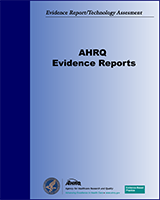NCBI Bookshelf. A service of the National Library of Medicine, National Institutes of Health.
Ip S, Fu L, Balk E, et al. Update on Acute Bacterial Rhinosinusitis. Rockville (MD): Agency for Healthcare Research and Quality (US); 2005 Jun. (Evidence Reports/Technology Assessments, No. 124.)
This publication is provided for historical reference only and the information may be out of date.
The Tufts-New England Medical Center (Tufts-NEMC) Evidence-based Practice Center (EPC), under a contract from the Agency for Healthcare Research and Quality (AHRQ), produced the original evidence report on the Diagnosis and Treatment of Acute Bacterial Rhinosinusitis (March 1999).1 Key points from the report relevant to this review are:
- About two-thirds of the patients receiving placebos recovered without antibiotics.
- Antibiotics are significantly more effective than placebo for treating acute bacterial sinusitis, reducing the clinical failure rate by one-half (risk ratio [RR], 0.54; 95 percent confidence interval [CI], 0.37 to 0.79). Patients are cured more quickly and more often when treated with antibiotics compared with no treatment.
- Amoxicillin and folate inhibitors were as efficacious as the newer and more expensive antibiotics.
- About 4 percent of the patients in the amoxicillin arms of the clinical trials withdrew as a result of side effects, but this percent did not differ statistically from that in patients treated with other antibiotics.
The EPC Program periodically seeks updates of evidence reports when justified by current scientific evidence. In the intervening 6 years since the original report, newer antibiotics have been introduced and universal pneumococcal vaccination implemented in care of the pediatric population. To examine the effects of these developments on the treatment of acute bacterial sinusitis, the Tufts-NEMC EPC reviewed the literature published since the last report for the research questions listed below. Our objective was to identify and analyze evidence from comparative studies on the antibiotic efficacies in the treatment of acute bacterial sinusitis.
Research Questions
In 2004, after consultation with our panel of technical experts, we developed the following research questions for this report:
- Given a clinical diagnosis of acute bacterial rhinosinusitis, what are the comparative efficacies of the antibiotics in resolving symptoms and preventing complications or recurrence?1a Is there evidence that duration of antibiotic treatment in acute bacterial rhinosinusitis affects efficacy?
- What adverse effects are reported for antibiotics used for acute bacterial rhinosinusitis?
- How does the introduction of the pneumococcal vaccine affect the resistance patterns of pneumococcus and the treatment decisions in acute bacterial rhinosinusitis?
- Introduction - Update on Acute Bacterial RhinosinusitisIntroduction - Update on Acute Bacterial Rhinosinusitis
Your browsing activity is empty.
Activity recording is turned off.
See more...
